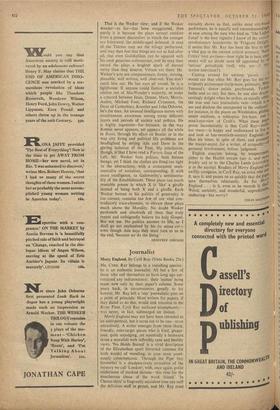Journalist Merry England. By Cyril Ray. (Vista Books, 25s.)
MR. CYRIL RAY belongs to a vanishing species: he is an authentic journalist. All but a few of those who call themselves so have long ago sur- rendered any independence: their 'names' being made now only by their paper's column. Some years back, in circumstances greatly to his honour, Mr. Ray left a 'star' journalistic post on a point of principle. Most writers for papers, if they dared to do this, would sink traceless in the River Fleet. Cyril Ray surfaced triumphantly— was never, in fact, submerged an instant.
Merry England may not have been intended as an auto-portrait, but it turns out to be one—most attractively. A writer emerges from these sharp, friendly, onto-target pieces who is kind, gregar- ious, quite unjudging, yet essentially a humanist (even a moralist) with inflexibly sane and healthy views. 'No Holds Barred' is a vivid description of the Elizabethan sport (inverted commas for both words) of wrestling, in tone most court- eously contemptuous. 'Through the Pipe' (my favourite) is a deadpan-crazy evocation of the mystery we call 'London'; with, once again, polite undertones of marked distaste—this time for the treacherous abuse - of the word 'friend.' In Cheese-shire' is fragrantly succulent (one can sniff the delicious stuff in prose), and Mr. Ray most
enviably shows us that, unlike most city-based performers, he is equally and uncondescendingly
at ease among the men who feed us. 'The Ladies
Local' is the best vignette I know of the socially' revolutionary launderette. In 'Fragrant Delight, it seems that Mr. Ray has been the first to spot a vital gap in the current critical armoury. 'Scent Critics' (not perfume—how right he is here, once more) will no doubt soon be appointed by au,, 'serious' periodicals (well, why not— it the) review television?). Casting around for adverse 'points 1 would say that often Mr. Ray goes for the 100 evidently picturesque (strip-tease, palmistry, Mile
Tussaud's, dance palais, greyhounds, Turkish baths and so on); but then, he can also discon'
certingly delight when he strikes, as equally often the true and rare journalistic vein—which is td see and disclose the unexpected in the ordinarY: for instance, in the pieces on Wimbledon, gliding' smart auctions, a subtopian fox-hunt, and man's-eye-view of Cruft's. What these page; prove incontestably is that Cyril Ray—unl"'; too many—is happy and undismayed to live and look at late-twentieth-century England: be likes his times, in spite of them, and possesses themaster-secret, for a writer, of sympathY4,f personal involvement, before 'judgment.' English essayists belong, by temperament' either to the Hazlitt stream (say it. and 101' briskly on) or to the Charles Lamb (everY111 is in the saying). Readers of Merry England Os swiftly recognise, in Cyril Ray, an artist who see it, says it, and passes on so quickly that the pages turn themselves reluctantly. As for Mer!? England . . . is it, even as he records it, thai Weird, certainly, and wonderful, unpredictable' endearing—but merry?
COLIN MACIN°


















































 Previous page
Previous page